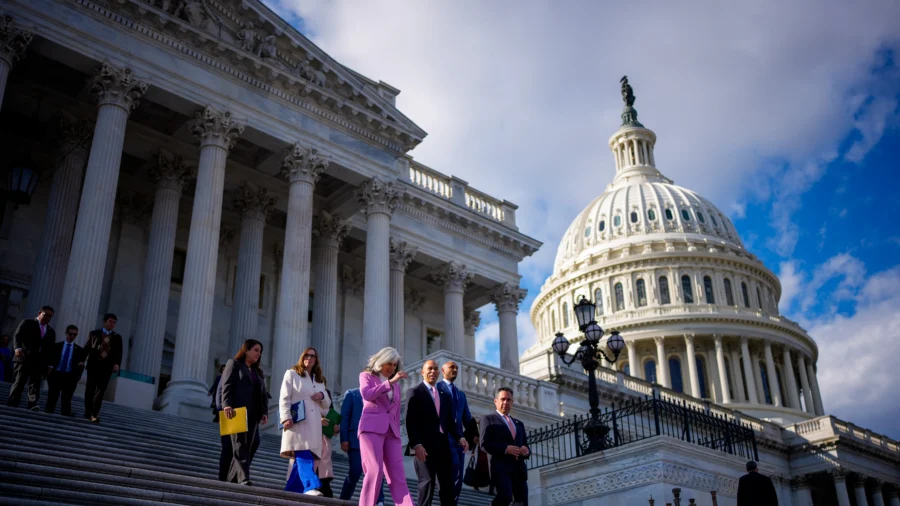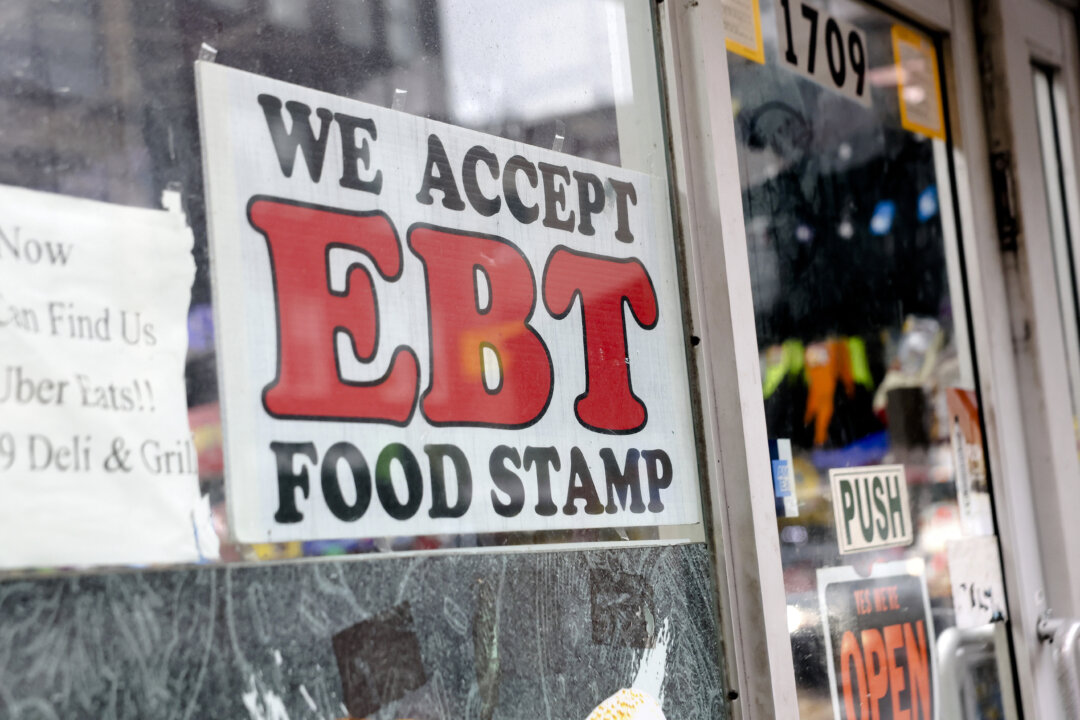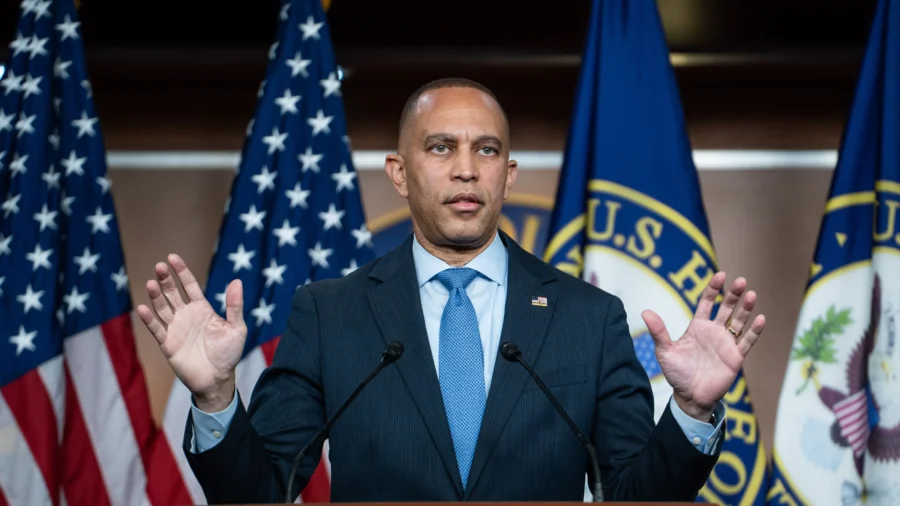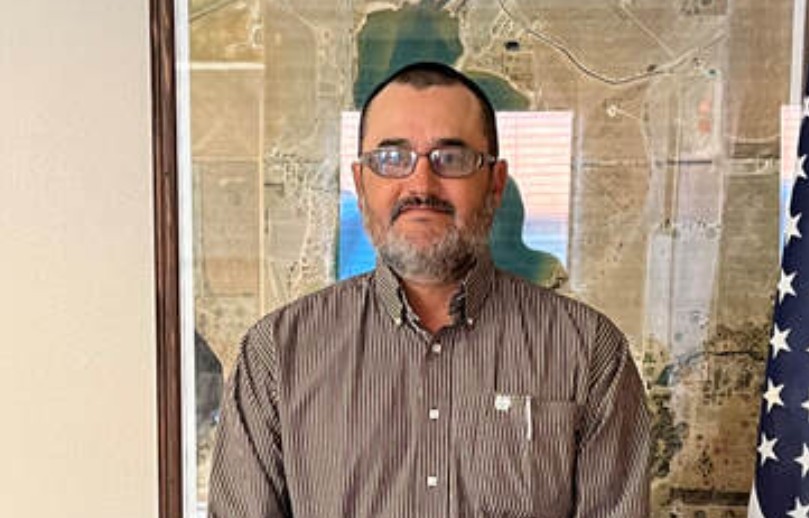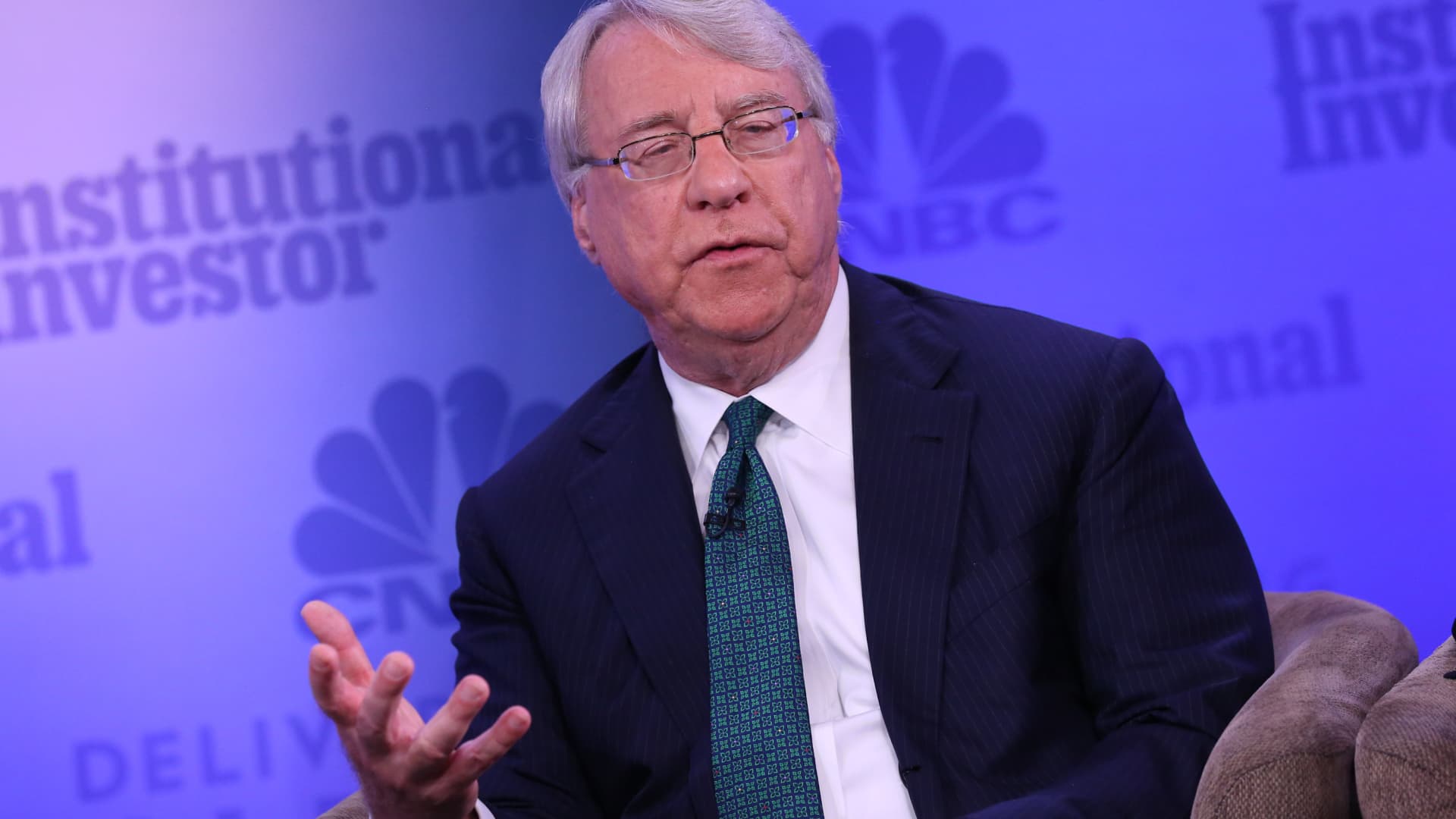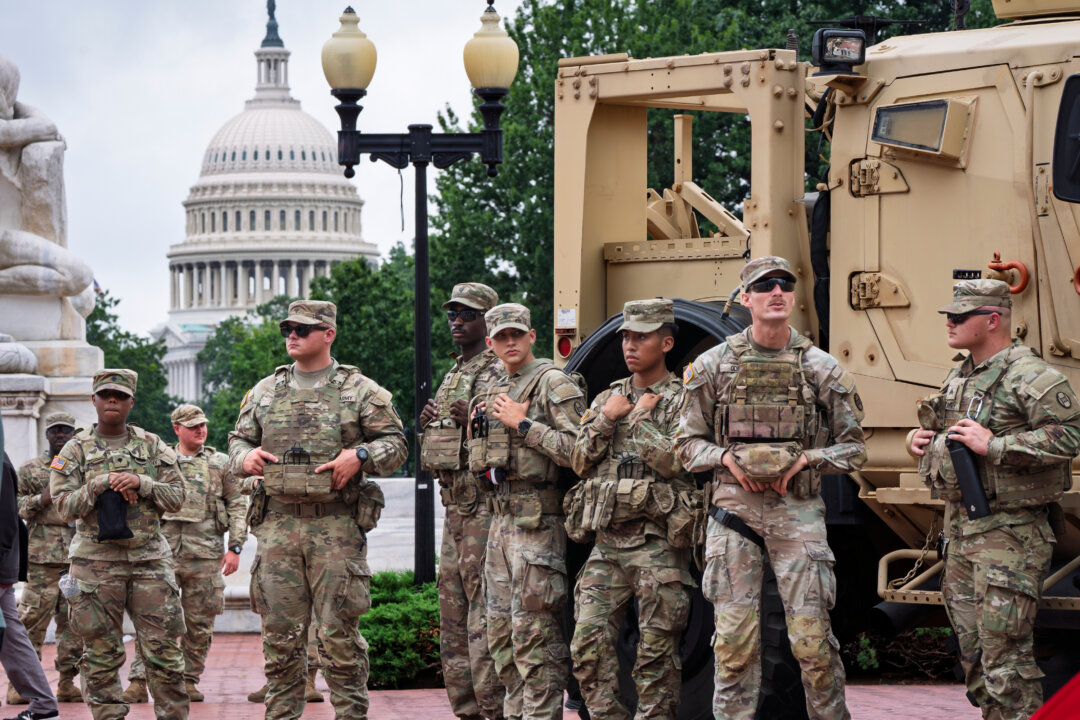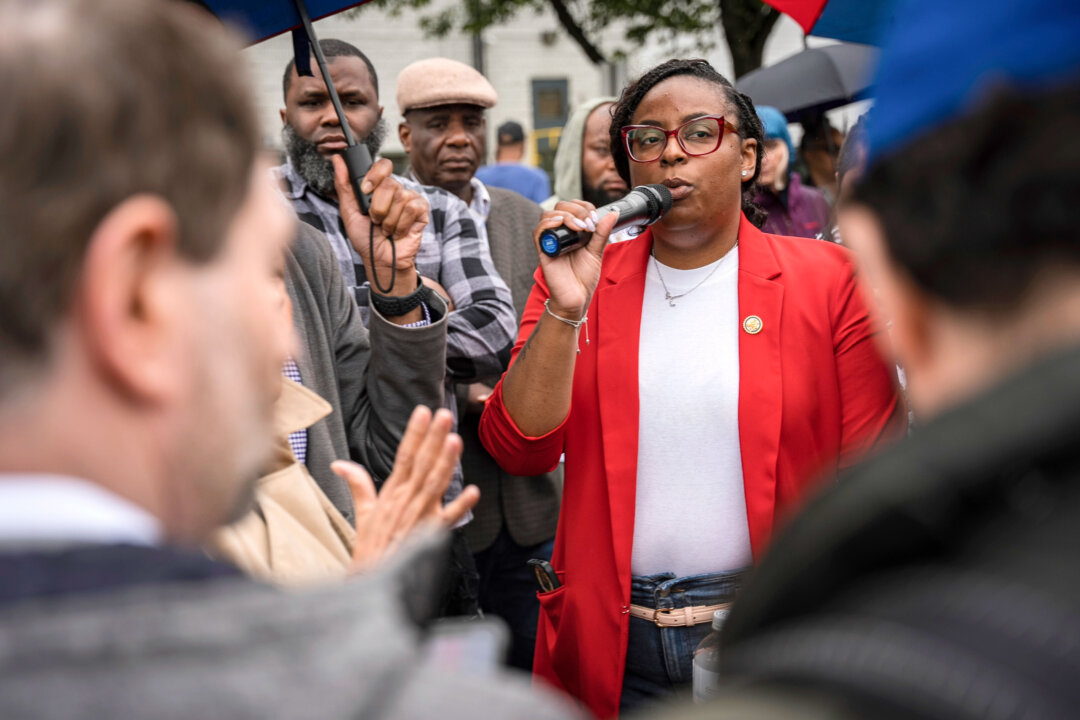Congress awards Indira Gandhi Peace Prize to former UNHR head Michelle Bachelet: Read how she invoked Kashmir, challenged CAA, attacked India during her tenure
Michelle Bachelet, the former head of United Nations Human Rights received the Indira Gandhi Prize for Peace, Disarmament and Development for 2024 from Congress Parliamentary Party (CPP) chairperson Sonia Gandhi on 19th November. She also served as Chile’s only female president, from 2006 to 2010 and 2014 to 2018. “Bachelet has seen, first-hand, loss, oppression, torture and exile in her early years. It is a remarkable coincidence how both these women were born and raised in times of strife. Their country, their people, their family and they themselves were victims of subjugation,” Sonia claimed while trying to draw parallel between the awardee and India’s former prime minister. The event transpired in the presence of 1984 anti-Sikh riots accused Jagdish Tytler. Meanwhile, Bharatiya Janata Party promptly slammed the decision, emphasising Bachelet’s contentious history which is marked by consistent anti-India position under the guise of “minority rights” and “freedom of speech.” Congress’s decision to award the Indira Gandhi Peace Prize to Michelle Bachelet is as revealing as it is predictable. Bachelet, the former President of Chile and UN Human Rights Commissioner between 2018 and 2022, built her tenure on a distinctly anti-India, pro-Islamist… pic.twitter.com/lTpyp6T568— Amit Malviya (@amitmalviya) November 19, 2025 “She believed that nations could prosper only if they lived in harmony with one another. This belief feels even more urgent in today’s fragmented world. One of the causes that deeply moved Indira Gandhi is also what inspired me to enter politics to improve the welfare of the people. Early in my life, I realised that people’s wellbeing is closely linked to respect for human rights,” Bachelet asserted on the occasion. She added, “To be honest, at times when I look at the world today, I feel not so optimistic. That is why I think multilateralism is more needed than ever. We need to give global responses to global challenges; otherwise, humanity will not have a good time.” Obsession with Kashmir Bachelet gained a reputation for opposing India during her tenure at the United Nations and has consistently intervened in internal matters. Kashmir was featured in her opening statement after she assumed office in 2018, charging that the council’s recent report on the human rights situation “has not been followed up with meaningful improvements, or even open and serious discussions on how the grave issues raised could be addressed.” “The people of Kashmir have exactly the same rights to justice and dignity as people all over the world, and we urge the authorities to respect them. The office continues to request permission to visit both sides of the Line of Control, and in the meantime, will continue its monitoring and reporting,” she conveyed. India appropriately responded to how these issues are “addressed constructively with respect for national sovereignty and territorial integrity in a transparent and credible manner” and expressed regret over her statement. Nevertheless, Bachelet’s attempts to interfere in India’s affairs persisted unabated and prominently emerged after India abrogated Article 370, which did not hold a permanent position in the Indian Constitution, on 5th August 2019. “I am deeply concerned about the impact of recent actions by the government of India on the human rights of Kashmiris, including restrictions on internet communications and peaceful assembly, and the detention of local political leaders and activists,” she declared on 9th September of that year during the 42nd session of the council. It is noteworthy that the article was discriminatory towards lower castes, women and various segments of society. It was solely manipulated by Kashmiri politicians, vested interests and pro-separatist factions to impede reforms, serve as leverage to blackmail New Delhi and prevent the state’s integration into the national mainstream. However, Bachelet appeared to be rather frustrated with the landmark decision. She specifically asked India to lift the lockdown and curfew and consult “the people of Kashmir in the decision-making process.” The measures taken by the government prevented any extensive bloodshed and violence in the valley but her primary concern was the mainstreaming of Islamists in the name of all Kashmiris while she ignored the regular atrocities committed by the Pakistani government in Pakistan Occupied Kashmir. As expected, then prime minister of Pakistan Imran Khan also praised her comment and urged the United Nations High Commissioner for Refugees (UNHCR) to establish an impartial commission to “probe” human rights abuses in the valley. Bachelet also targeted India over the National Register of Citizens (NRC) in Assam. “The recent National Register of Citizens verification process in the North-East Indian state of Assam has caused great uncertainty and anxiety, with some 1.9 million people excluded from the final list
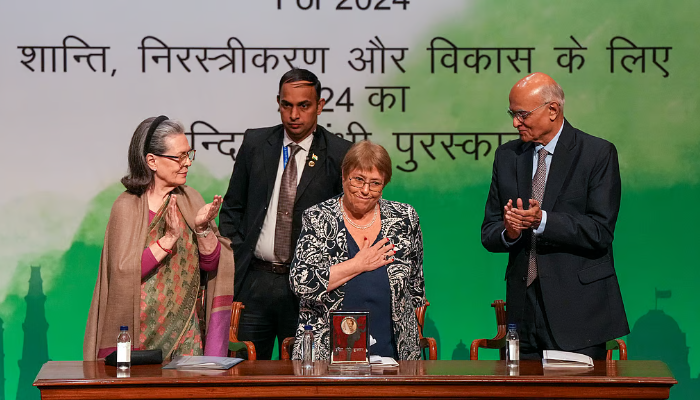


Michelle Bachelet, the former head of United Nations Human Rights received the Indira Gandhi Prize for Peace, Disarmament and Development for 2024 from Congress Parliamentary Party (CPP) chairperson Sonia Gandhi on 19th November. She also served as Chile’s only female president, from 2006 to 2010 and 2014 to 2018.
“Bachelet has seen, first-hand, loss, oppression, torture and exile in her early years. It is a remarkable coincidence how both these women were born and raised in times of strife. Their country, their people, their family and they themselves were victims of subjugation,” Sonia claimed while trying to draw parallel between the awardee and India’s former prime minister.
The event transpired in the presence of 1984 anti-Sikh riots accused Jagdish Tytler. Meanwhile, Bharatiya Janata Party promptly slammed the decision, emphasising Bachelet’s contentious history which is marked by consistent anti-India position under the guise of “minority rights” and “freedom of speech.”
Congress’s decision to award the Indira Gandhi Peace Prize to Michelle Bachelet is as revealing as it is predictable. Bachelet, the former President of Chile and UN Human Rights Commissioner between 2018 and 2022, built her tenure on a distinctly anti-India, pro-Islamist… pic.twitter.com/lTpyp6T568
— Amit Malviya (@amitmalviya) November 19, 2025
“She believed that nations could prosper only if they lived in harmony with one another. This belief feels even more urgent in today’s fragmented world. One of the causes that deeply moved Indira Gandhi is also what inspired me to enter politics to improve the welfare of the people. Early in my life, I realised that people’s wellbeing is closely linked to respect for human rights,” Bachelet asserted on the occasion.
She added, “To be honest, at times when I look at the world today, I feel not so optimistic. That is why I think multilateralism is more needed than ever. We need to give global responses to global challenges; otherwise, humanity will not have a good time.”
Obsession with Kashmir
Bachelet gained a reputation for opposing India during her tenure at the United Nations and has consistently intervened in internal matters. Kashmir was featured in her opening statement after she assumed office in 2018, charging that the council’s recent report on the human rights situation “has not been followed up with meaningful improvements, or even open and serious discussions on how the grave issues raised could be addressed.”
“The people of Kashmir have exactly the same rights to justice and dignity as people all over the world, and we urge the authorities to respect them. The office continues to request permission to visit both sides of the Line of Control, and in the meantime, will continue its monitoring and reporting,” she conveyed.
India appropriately responded to how these issues are “addressed constructively with respect for national sovereignty and territorial integrity in a transparent and credible manner” and expressed regret over her statement.
Nevertheless, Bachelet’s attempts to interfere in India’s affairs persisted unabated and prominently emerged after India abrogated Article 370, which did not hold a permanent position in the Indian Constitution, on 5th August 2019.
“I am deeply concerned about the impact of recent actions by the government of India on the human rights of Kashmiris, including restrictions on internet communications and peaceful assembly, and the detention of local political leaders and activists,” she declared on 9th September of that year during the 42nd session of the council.
It is noteworthy that the article was discriminatory towards lower castes, women and various segments of society. It was solely manipulated by Kashmiri politicians, vested interests and pro-separatist factions to impede reforms, serve as leverage to blackmail New Delhi and prevent the state’s integration into the national mainstream. However, Bachelet appeared to be rather frustrated with the landmark decision.
She specifically asked India to lift the lockdown and curfew and consult “the people of Kashmir in the decision-making process.” The measures taken by the government prevented any extensive bloodshed and violence in the valley but her primary concern was the mainstreaming of Islamists in the name of all Kashmiris while she ignored the regular atrocities committed by the Pakistani government in Pakistan Occupied Kashmir.
As expected, then prime minister of Pakistan Imran Khan also praised her comment and urged the United Nations High Commissioner for Refugees (UNHCR) to establish an impartial commission to “probe” human rights abuses in the valley.
Bachelet also targeted India over the National Register of Citizens (NRC) in Assam. “The recent National Register of Citizens verification process in the North-East Indian state of Assam has caused great uncertainty and anxiety, with some 1.9 million people excluded from the final list published on August 31. I appeal to the government to ensure due process during the appeals process, prevent deportation or detention, and ensure people are protected from statelessness,” she added.
The government’s initiative to identify its citizens, aimed not only at fostering development but also at ensuring internal and border security was not well received by her either. Bachelet evidently wanted India to remain a center for infiltrators from neighbouring countries, particularly Bangladesh who not only alter demography and take over the rightful share of Indians over the nation’s resources but also perpetrate criminal activities.
She peddled the narrative of “Kashmiris under attack” after the Pulwama terror attack in 2019, utilising both India’s decisions and tragedies to portray the country negatively and deliver sermons to it.
Continuous rhetoric surrounding Kashmir and unwarranted aggression towards India
The former chief of human rights at the UN met with the Organization of Islamic Cooperation (OIC) contact group in Geneva concerning Jammu and Kashmir, in 2020. Afterward, she alleged that “human rights violations have worsened in the last year, characterised by excessive use of force” including “pellet guns, home demolitions, imprisonment of civilians, torture, demographic engineering, etc.,” in the state.
The nations where non-Muslims are deprived of fundamental rights and relegated to second-class citizenship as well as the worst violators of human rights accused India of imposing a serious human rights crisis in Kashmir and informed her about the same. Pakistan is also a member of the OIC and the human rights record of this nation, along with its treatment of minorities, is just as alarming as that of its peers.
Moreover, Bachelet was troubled by the potential loss of Muslim supremacy in Kashmir but advocated for India to welcome intruders into the country.
On 13th September 2021, she again sought to raise the issue of Kashmir amid the 48th session of the Human Rights Council. “The restrictions on public assembly and frequent temporary communication blackouts by Indian authorities continue in Jammu and Kashmir, while hundreds of people remain in detention for exercising their right to the freedom of expression, and journalists face ever-growing pressure,” she insisted.
Bachelet intentionally ignored the massive transformation of Kashmir following 2019 and focused on the Unlawful Activities Prevention Act (UAPA) cases in India during the same speech. She even made efforts to subvert India’s laws in line with her whims and wishes, deliberately failing to acknowledge the critical ground reality in the nation and the robust judicial apparatus in the country.
However, she was confronted with a suitable reply from India, but it did nothing to diminish her disdain for the nation or her nefarious intention to intrude into India’s issues.
“India’s approach to global promotion and protection of human rights is based on our own experience as a pluralistic and inclusive society and vibrant democracy. Any shortcomings in upholding human rights must be addressed in a transparent and impartial manner, anchored in respect for national sovereignty and non-interference in internal affairs of states,” countered the Ministry of External Affairs.
Cries of Muslim victimhood
How can any member of the leftist-liberal group refrain from attacking India on minority rights, particularly concerning Muslims, regardless of the truth? Hence, Bachelet also did not disappoint during her annual report to the UN Human Rights Council in Geneva in 2019.
“We are receiving reports that indicate increasing harassment and targeting of minorities – in particular, Muslims and people from historically disadvantaged and marginalised groups, such as Dalits and Adivasis,” she voiced.
Bachelet then called on the Indian government to review the “worrying” Foreign Contribution Regulation Act (FCRA) a year later and permit non-governmental organisations and “human rights” bodies to receive their funding and function freely in the nation.
“India has long had a strong civil society, which has been at the forefront of groundbreaking human rights advocacy within the country and globally. But I am concerned that vaguely defined laws are increasingly being used to stifle these voices,” she accused.
These entities had been involved in not only hindering developmental programs but also in religious conversions disguised as humanitarian aid. Therefore, this measure was intended to ensure transparency and accountability in the activities of these NGOs. The law introduced in 2010 by the Congress-led government was revised to prohibit the acceptance of foreign funds for any activities detrimental to the public interest.
“Violations of law, however, cannot be condoned under the pretext of human rights. A more informed view of the matter was expected of a UN body,” New Delhi retorted after Bachelet’s utterances. India maintained that it had a strong domestic grievance redressal system, an independent judiciary alongside category “A” National Human Rights Commission that complies with the Paris Principles as well as a dynamic and pluralistic democracy.
“These mechanisms are fully capable of addressing all allegations of violations of human rights anywhere in India. India has been at the forefront of the promotion and protection of human rights in line with its international obligations and remains committed to doing so in the future,” an official added, reported The Times of India.
Striking hypocrisy on CAA
Bachelet, who was “deeply concerned” about minority rights in India seemed to lack similar sentiments for the persecuted minorities of Bangladesh, Afghanistan and Pakistan as she approached the Supreme Court against the Citizenship Amendment Act at the beginning of March 2020. Her UN Human Rights Office filed a request for third-party status in a petition contesting the the act, ironically, in the name of human rights.
“The CAA is an internal matter of India and concerns the sovereign right of the Indian Parliament to make laws. We strongly believe that no foreign party has any locus standi (rights) on issues pertaining to India’s sovereignty,” the government lashed out at her move.
However, Bachelet continued her intrusion and alleged that the CAA’s religion-based standards run the risk of violating international commitments, as late as 2024. The oppression of Hindus and other non-Muslim minorities based on religion apparently does not breach any international obligations, but helping them does.
Another instance of her hypocrisy surfaced when Saudi Arabia sent hundreds of Rohingyas, including children, to Bangladesh and she remained silent but opted to attack India after the country deported just five.
Conclusion
Bachelet is a notably polarising figure and her tenure at the UN is marred by her actions driven by animosity towards India. Despite her grand statements and advocacy for human rights, her tenure and actions unmistakably showed that her concern was largely limited to the rights of a particular group of individuals of a specific religion.
Interestingly, George Soros received the Bernardo O’Higgins Order of Merit from Bachelet in 2009 in appreciation of his “unwavering commitment to democracy and open societies.” It is the highest civilian award given to non-Chilean citizens.
Soros’s malevolent agenda concerning India, which he has openly expressed on many occasions, is well-known to all. He is a leading instigator of engineered revolts in nations to set up his preferred puppet government and has been making efforts to do the same in India.
Now, for Congress, which has never hesitated to align itself with the detractors of India even during crucial moments, awarding Bachelet is clearly not a significant issue. Nevertheless, the BJP has rightly raised objections to the development as she has been quite critical of India unnecessarily and taken advantage of her position to interfere, influence and demean the country.







